The same but different
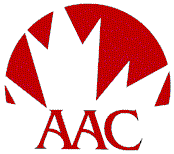 The
Agility Association of Canada (AAC) was founded in 1988 by Art Newman. At first, there were
only a handful of people involved nationwide, but the numbers have increased apace and now
there are about 900 members. Because it is not necessary to be a member of the association to
compete, the actual number of dogs who enter events is probably closer to 2,000. The rules are
probably similar to those in the UK - dogs have to go THROUGH tunnel and OVER jumps - but there
are differences. Maureen Jennings and Lynda Yielding go into the nitty gritty of agility the
Canadian way. The
Agility Association of Canada (AAC) was founded in 1988 by Art Newman. At first, there were
only a handful of people involved nationwide, but the numbers have increased apace and now
there are about 900 members. Because it is not necessary to be a member of the association to
compete, the actual number of dogs who enter events is probably closer to 2,000. The rules are
probably similar to those in the UK - dogs have to go THROUGH tunnel and OVER jumps - but there
are differences. Maureen Jennings and Lynda Yielding go into the nitty gritty of agility the
Canadian way.
What is different is the structure of the trials. Unlike
the European system, we have four levels of jump heights. The standards are 10", 16", 22" and
26". In addition, we have a Veterans class for older dogs who still want to run but have a
difficult time with the higher jumps, and are allowed to lower their jump height by
up to two jump heights. Veterans will have the A-Frame lowered to 5”0”.
We also have a specials division, which is designed for
those handlers that feel a 6’3” A-frame is too steep for their dog and the measured jump
height is too high. As well spreads and and doubles are removed and dogs in this division will
jump one jump height lower than their official jump height.
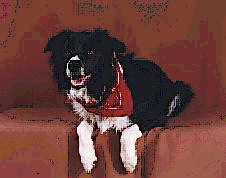 There
are three levels of difficulty. There
are three levels of difficulty.
- Starters
- Advanced
- Masters
You can move up to the next level after three qualifying
runs (running clean within the allotted time) under two different judges. In addition to
standard courses, there are four divisions of games - Jumpers, Gamblers and Snooker and a Team
course which involves two handlers and their dogs, each running half a course with a baton to
pass on in an exchange box, just like a relay.
Agility shows
Trials are held both indoors and outdoors and can
be made up of any combination of courses - i.e. just games, just standard, or some of each.
Because of this system, a dog does not have to win out to be a champion. This means dogs who
genetically couldn't compete with the impossible border collies, can rise to the top and get
their titles.
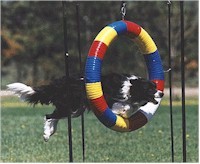 The
first national championship The
first national championship
This year is the first time we have had a
National Competition. The first round was at the Provincial level and the National was held
outdoors in Calgary, Alberta. At the regional provincial competitions, a dog and handler had to
achieve 300 points or more (out of a possible 600) to qualify for the nationals. On each day, a
dog and handler competed in one standard course, one jumpers and one gamblers course. This
arrangement was repeated at the Nationals.
The rules for the Regionals and the Nationals were
different from the scoring in regular trials in that the scoring system was based on 'modified
masters' rules. This means that no one was eliminated because of faults and points were
accumulated over 6 events held on two days. However, if a handler made an error on course, the
penalty was significant. There were awards in each of the six events for regular, veterans and
specials classes as well as awards for overall placement in each height division.
Lynda's reflections
Because this was a first, there was considerable (probably self-induced) pressure,
to put on a great show and that was achieved by the three agility groups in Calgary putting on
the show. The show venue was Spruce Meadows, Canada's finest equestrian site. There were three
trial rings operating at the same time - one for the standard course, one for jumpers and one
for gamblers. The spectators loved it.
The qualifiers were divided into three groups, and each
group rotated through the three rings. The two days ran very smoothly and there was tremendous
interest from the public. The feeling among competitors differed. Some wanted to see all the
other competitors in their jump height - to keep track of where they were in the standings.
Others, like me, were just glad to be a part of the fun, as we weren't going to place in the
top ten.
I compete with a Nova Scotia Duck Tolling Retriever who
jumps in the 22" regular division - a very competitive group with lots of Border Collies in it.
We did get one fourth place in the Gamblers event on the first day which pleased me greatly.
One of the things that I noticed was that the ribbons (first to sixth in each event) were
spread out somewhat. They weren't all picked up by the same six handlers.
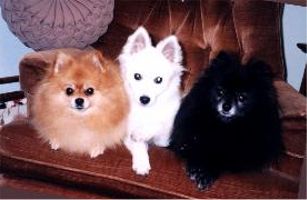 One
of the role models for all of us was Shirley McRitchie - a wonderful competitor with two 10"
regular dogs who placed first and second overall in that division. She treats her dogs
beautifully, is always encouraging to others and, although quite competitive, she can laugh at
her mistakes, never blames the dog and she's still out there to have fun with her dogs. Shirley
has been involved in agility for ten years and is 73 years old. All in all, it was a great
experience, lots of fun and a great opportunity to talk with handlers from across the country. One
of the role models for all of us was Shirley McRitchie - a wonderful competitor with two 10"
regular dogs who placed first and second overall in that division. She treats her dogs
beautifully, is always encouraging to others and, although quite competitive, she can laugh at
her mistakes, never blames the dog and she's still out there to have fun with her dogs. Shirley
has been involved in agility for ten years and is 73 years old. All in all, it was a great
experience, lots of fun and a great opportunity to talk with handlers from across the country.
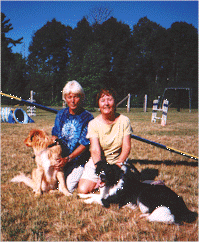 About
the authors About
the authors
Lynda Yielding started competing in agility with Shadow, her Nova Scotia Duck Tolling
Retriever, four seasons ago when he was two. Shadow has his Master Agility Dog title as well as
Master Games titles in all but team. He needs one qualifying score in team to achieve his ATCH.
(Agility Trial Champion of Canada).
Lynda recently certified as a judge. In the Fall of 2000,
she and her husband Dan, who is now trialling with Spryte, his young NSDTR, started Muskoka
Agility Dogs, a new lesson and trial site in Huntsville, two hours north of Toronto.
Maureen Jennings.
This is Maureen's third season of agility and she is completely addicted to it. She has a
Border Collie named Jeremy-Brett and when he's good he's amazing and when he's out of his mind
with over-stimulation, she feels as if she trying to catch an express train.
When she find time to earn a living, she writes
historical mysteries set in Victorian Toronto. She is always trying to find a way to introduce
dogs into the stories. You can see them on her web site http://www.maureenjennings.com
Photo: (left to right - Lynda Yielding & Shadow. Maureen
Jennings & Jeremy-Brett
|